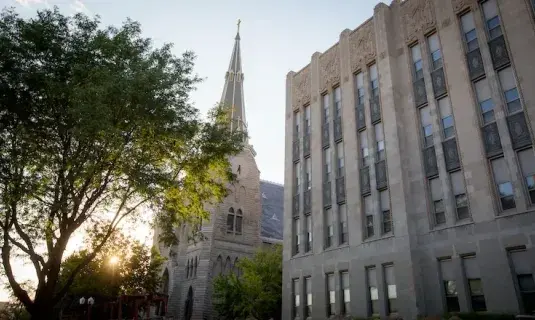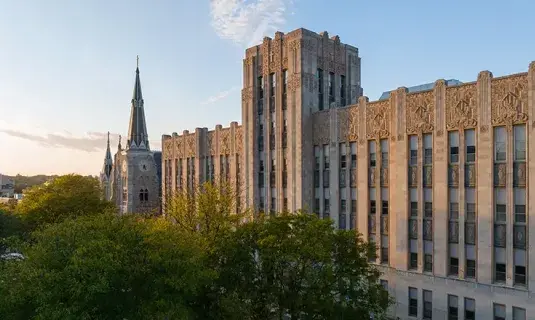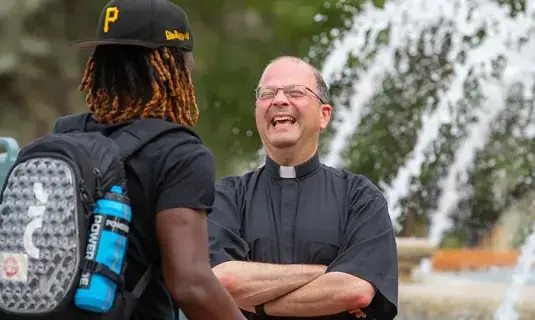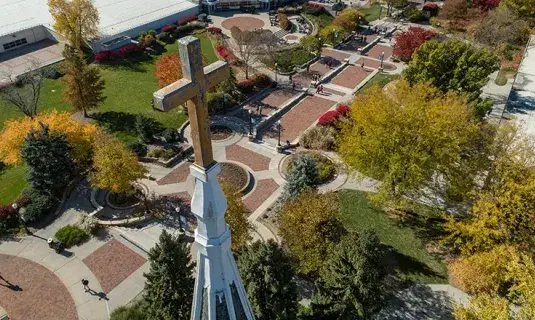
Mission and History
A Legacy of Purpose, Guided by Jesuit Values
Since its founding in 1878, Creighton University has been shaped by a mission rooted in Jesuit tradition: to form women and men who are committed to service, justice and academic excellence. Inspired by the vision of St. Ignatius of Loyola and made possible by the generosity of the Creighton family, the University continues to educate students who use their knowledge and compassion to make a difference in the world. This enduring commitment to faith and service remains at the heart of Creighton’s identity.
Creighton's Mission Statement
Creighton is a Catholic and Jesuit comprehensive university committed to excellence in its selected undergraduate, graduate and professional programs.
As Catholic, Creighton is dedicated to the pursuit of truth in all its forms and is guided by the living tradition of the Catholic Church.
As Jesuit, Creighton participates in the tradition of the Society of Jesus, which provides an integrating vision of the world that arises out of a knowledge and love of Jesus Christ.
As comprehensive, Creighton’s education embraces several colleges and professional schools and is directed to the intellectual, social, spiritual, physical and recreational aspects of students’ lives and to the promotion of justice.
Creighton exists for students and learning. Members of the Creighton community are challenged to reflect on transcendent values, including their relationship with God, in an atmosphere of freedom of inquiry, belief and religious worship. Service to others, the importance of family life, the inalienable worth of each individual and appreciation of ethnic and cultural diversity are core values of Creighton.
Our faculty members conduct research to enhance teaching, to contribute to the betterment of society, and to discover new knowledge. Faculty and staff also stimulate critical and creative thinking and provide ethical perspectives for dealing with an increasingly complex world.
The Jesuit, Catholic Values That Set Us Apart
Finding God in All Things
St. Ignatius of Loyola taught that everything that exists comes from a loving God who can be discovered in the world and in each person. Living with a commitment to “finding God in all things” means noticing and experiencing God’s active love in other people, in the world around us and in everyday moments (not only in explicitly religious settings). Each time we find God in this way, we have the chance to deepen our knowledge of, relationship with and responsiveness to God.
Cura Personalis
Cura personalis means “care for the whole person” or, more accurately, “care that is personal” in Latin. It’s about recognizing that every person is a unique gift from God, with their own talents, strengths and needs. Each of us is made in God’s image and inherently worthy of dignity. We are all meant to live fully, freely and authentically. At Creighton, this means we take time to understand, respect and support each individual as a whole person. We focus on your growth in every area, including intellectual, physical, artistic, social, psychological, moral and spiritual well-being.
Reflection and Discernment
In our busy lives, it’s easy to get caught up in constant activity and distractions. The value of reflection and discernment invites us to slow down, pay attention and look inward. By making time each day to reflect, through practices like the Ignatian Examen, we strengthen our ability to “find God in all things” and to notice God’s presence in our lives and hearts. As we grow in this awareness, we become better able to recognize and follow God’s unique invitations for each of us.
Magis “More”
Magis, meaning "more," challenges us to seek what leads to the greatest good; the choices, actions and commitments that help us grow more fully and contribute to something bigger than ourselves. The Latin phrase Ad Majorem Dei Gloriam, meaning “For the Greater Glory of God,” is the motto of the Society of Jesus and captures the spirit of magis. It reminds us to live with purpose and aim for what matters most.
For and With Others
Our Jesuit tradition calls us to look beyond ourselves and live as people who are “for and with others,” building genuine relationships with individuals and communities who are poor or marginalized. These connections help us understand our shared humanity and develop a sense of solidarity that inspires us to use our talents, time and energy to work toward a world that better reflects God’s vision for all people and the earth we share.
Faith that Does Justice
In the Jesuit, Catholic tradition, faith is not only what we believe but also how we live. “Faith that does justice” means putting love into action. It means working alongside God and with others to seek the common good and help create a more just world.










